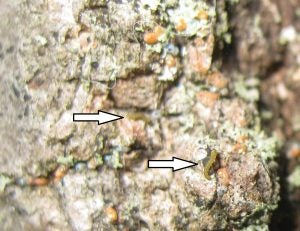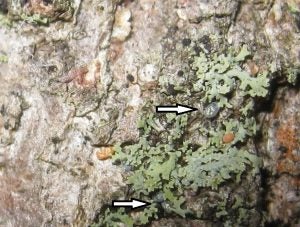Winter moth hatching in Franklin, MA 4/6/17
April 6, 2017
Winter moth eggs started hatching in Franklin, MA, about 10 miles north of Rhode Island. This site usually has very early egg hatch and there are hundreds of eggs to monitor. Only a very small portion of eggs have changed from orange to blue and even fewer eggs have hatched. Looking at predicted weather, I think apple and blueberry growers not along the coast, should spray an insecticide this weekend. Coastal properties are cooler and we expect eggs to hatch later there. Dormant oil (2-3% solution) added to an insecticide spray can help control winter moth eggs, but temperatures are predicted to be near freezing Saturday night. Dormant oil should not be applied if temperatures are expected to go below 40 degrees for 48 hours after application.

Arrows pointing to newly hatched winter moth caterpillars.
Arrows pointing at winter moth eggs that have turned blue before hatching.
The following paragraphs are repeated from April 4th message:
Those of you wanting to protect apples, pears, and blueberries from winter moth caterpillars should plan on applying an insecticide soon – once winter moths start hatching in your area. Since winter moth caterpillars do not feed as they crawl into buds, a contact insecticide is needed. Unfortunately, a Bt insecticide such as DiPel or Biobit is not effective against newly hatched caterpillars since Bt must be ingested to be effective. Insecticide choices to control hatching caterpillars for fruit growers include spinosad and Imidan. Spinosad product are Delegate (for commercial growers), Entrust (for organic growers), and Captain Jack’s Deadbug Brew (for backyard growers). Adding a dormant oil may increase effectiveness of these insecticides.
It depends on the weather whether or not one insecticide application can sufficiently control winter moth caterpillars. Rain reduces effectiveness of insecticides and cool temperatures extend how many days it takes for all overwintering winter moth eggs to hatch. My team of egg monitors will tell me when eggs start to turn blue, when they start to hatch, and when eggs have completed hatching. Eggs are being monitored in Cumberland, Smithfield, North Scituate, Warwick, North Kingstown, South Kingstown, Charlestown, Jamestown, Tiverton, Little Compton, and Westerly, RI, Franklin, MA, Hanson, MA, and Pawcatuck. CT.
Once winter moth caterpillars are inside buds they are protected from insecticides, so to protect this year’s fruit crop it is important to apply an insecticide to fruit buds when eggs start hatching.
Once buds open, B.t. kurstaki products (Bacillus thuringiensis kurstaki) such as DiPel and Biobit work well controlling winter moth caterpillars. For landscape trees, caterpillars can be controlled with B.t. kurstaki (Dipel Pro, Javelin, and others) or spinosad (Conserve) after leaves emerge. B.t. products are a good choice because they kill only caterpillars, but B.t. products break down in sunlight after 3-5 days so may need to be reapplied more frequently. Most other insecticides will kill bees in addition to winter moth caterpillars so do not apply insecticides to blooming plants or near blooming plants.
 Home
Home Browse
Browse Close
Close Events
Events Maps
Maps Email
Email Brightspace
Brightspace eCampus
eCampus



